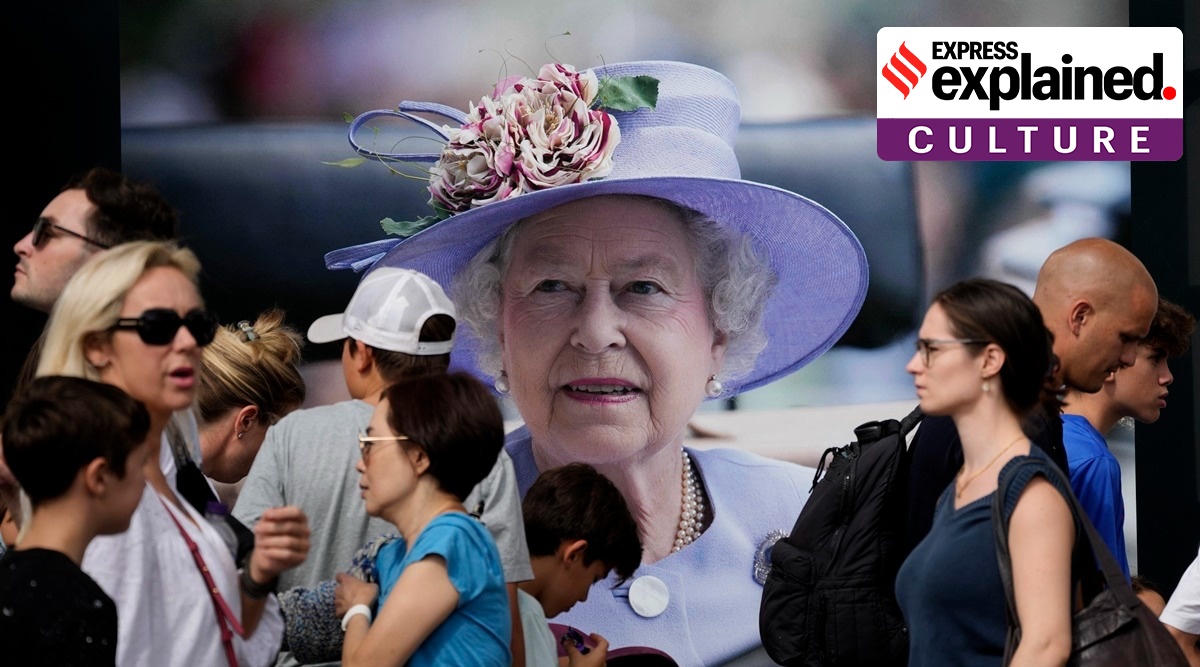What having a ‘stiff upper lip’ means and how it became associated with Britain
A long-held attitude meant to display bravery and rationality, the stiff upper lip has come under a re-look in the modern day by the likes of Princess Diana, Princes William and Harry and Meghan Markle. What are its origins? We explain.
 While the late Queen Elizabeth has invoked the idea often, most recently during the covid pandemic, the Queen's third generation has publicly warned against "stiff upper lip". (Photo via AP)
While the late Queen Elizabeth has invoked the idea often, most recently during the covid pandemic, the Queen's third generation has publicly warned against "stiff upper lip". (Photo via AP) The much-debated British phrase “stiff upper lip” has been brought into the spotlight once again with Nobel laureate Kazuo Ishiguro, known for his 1989 novel The Remains of the Day, recently speaking on how Britain’s particular brand of emotional coldness had a lot to do with the British empire.
Preparing for UPSC? Use CRACKUPSC20 code here to get an extra 20% discount on Indian Express subscription.
Speaking to AFP following the release of the British drama film Living, whose screenplay Ishiguro wrote, he said the stoic expression of the Brits has dissolved and softened over the years. The drama, adapted from the 1952 Japanese film Ikiru, depicts a reserved bureaucrat in 1950s London who emerges from his shell only when his death is imminent.
What does ‘stiff upper lip’ mean?
According to the Merriam-Webster Dictionary, the phrase means maintaining a steady and determined attitude or manner in the face of trouble. The Macmillan dictionary defines it as a quality of remaining calm and not letting other people see what you are really feeling in a difficult or unpleasant situation.
The phrase has traditionally been used to describe a general attribute of British people in remaining resolute and unemotional when faced with adversity. Though it has faded to some extent with modern-day British people expressing their emotions quite openly, the trait has been kept alive in some ways, for instance by some members of the British royal family.
Why is ‘stiff upper lip’ closely associated with Britain?
The idea of the stiff upper lip can be traced back to Ancient Greece, to the Spartans, whose cult of discipline was a source of inspiration to the English public school system during the Victorian era. The concept reached England around the 1600s.
One of the first factors contributing to the formation of the trait was the French Revolution of 1789, which was a culmination of the on-and-off wars between France and England (later Great Britain) – from 1689 to 1815.
The contest began in the late 17th century, as England and other European states tried to contain the power and ambition of Louis XIV – who was publicly executed after the French National Convention convicted the king of high treason in 1793 – and ended with the defeat of Napoleon Bonaparte at the Battle of Waterloo.
The radical, political and societal uprising in France established the idea that the French had lost control and let their emotions get the better of them, a BBC report said, quoting Thomas Dixon’s book Weeping Britannia: Portrait of a Nation in Tears. Thus originated the idea that emotions were dangerous and needed to be restrained.
Also, the defeat of French emperor Napoleon led to the expansion of the British Empire, armed with a sense of superiority and emotional resolve. The stiff upper lip was then a concept of the upper and upper-middle classes and the military who were drilled to present that kind of front to their colonial subjects, in a bid to represent the ‘superior race’.
The concept featured in the works of British cultural icons: William Shakespeare’s plays, the poems of Rudyard Kipling and W E Henley and in the books of Charles Darwin and English author E M Forster, among others.
Britain’s emotional culture was further influenced by the two world wars, with the stoic attitude not just being limited to the upper class. Despite Britain emerging victorious in both wars, it had lost so much, socially and economically. However, a narrative was set for the government as well as the general public to demonstrate strength and bravery and not show emotions of fear and grief.
Has the idea of the ‘stiff upper lip’ continued over the years in Britain?
After World War 2, Britain saw its colonial rule collapsing and to keep up its labour force, the country brought in the British Nationality Act of 1948 that granted Commonwealth citizens the right to live and work in the UK. The law consolidated British citizenship by putting Britain’s colonial subjects on equal footing with those living in the British Isles and was likely made to try and avoid decolonisation.
This led to an influx of people into the country from across the world bringing with them varied cultures and slowly helping in dismantling the traditional stoic characteristic to a large extent. However, the royal family still kept the tradition with utmost sincerity.
One of the major events that later shook the stiff upper lip attitude off its roots was the death of Princess Diana in a car crash in 1997 which sparked an outpouring of public grief in the United Kingdom. The royal family was criticised by some for their reaction, as they did not display grief and put up a stiff front before the world.
Diana, unlike other royal members, was outspoken and connected with the people, which is why then Prime Minister Tony Blair posthumously dubbed her “the People’s Princess”.
How has the royal family’s emotional culture evolved in recent years?
Late Queen Elizabeth II, Britain’s longest-reigning monarch, kept the stiff upper lip attitude alive until her death this September.
In 2020, as the Coronavirus pandemic ravaged the globe, the Queen in a rare televised address to the nation, invoked a war-time spirit of self-discipline and resolve to fight the virus. Even as she acknowledged the grief and financial difficulties the world then faced, she said everyone will be able to take pride in how they responded to this challenge.
“And those who come after us will say that the Britons of this generation were as strong as any. That the attributes of self-discipline, of quiet good-humoured resolve and of fellow-feeling still characterise this country,” the Queen said in her address.
However, the Queen’s third generation has publicly warned against “stiff upper lip”. The face of this movement has been Diana’s sons, Prince William and Prince Harry.
In a rare interview with Canada’s CTV television in 2017, Harry spoke about his struggles in coping with the loss of his mother. Speaking with The Daily Telegraph later, he said that he “shut down all his emotions” for nearly 20 years, and had been “very close to a complete breakdown on numerous occasions.”
He described a long, painful process of refusing to face his sense of loss that only came to an end when he was in his late 20s and sought professional counselling to cope with the pressures and unhappiness. In the CTV interview, he said it is important to ask for help, saying “It is a sign of strength, it is a sign of bravery to ask for help.”
Harry, who served in the British army, also created the Invictus Games. Its aim is to use sports to help injured and wounded people in the military, and to motivate them on their path to recovery.
Following his younger brother’s interview, Prince William warned British men that keeping a “stiff upper lip” by bottling up emotions was detrimental to mental health. “There may be a time and a place for the ‘stiff upper lip’, but not at the expense of your health,” William said in an interview with the Campaign Against Living Miserably (CALM), a charity dedicated to preventing male suicide.
William and his wife Kate lead a campaign called ‘Heads Together’ that encourages people to open up about mental illness and seek help.
Later in 2019, in a documentary aired by The Telegraph, Duchess of Sussex Meghan Markle revealed that she tried to “adopt this British sensibility of a ‘stiff upper lip’” in the face of press scrutiny and racism, but added that “what that does internally is probably really damaging.”
Her remarks came after Markle sued British tabloid The Mail and its parent company The Associated Newspapers because it published a private letter that Markle had written to her estranged father, Thomas Markle. Markle sued the paper for copyright infringement and invasion of her privacy.
- 01
- 02
- 03
- 04
- 05






































